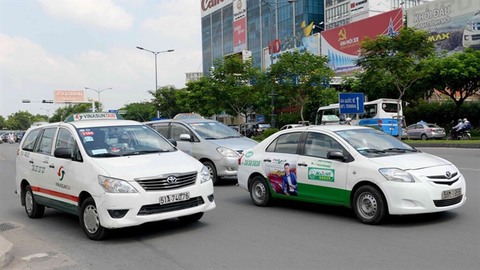
Associate Dr Tu Sy Sua, from the University of Transport, speaks to Vietnam News Agency on how to create a level playing field between traditional taxis and companies that employ app based taxi technology. — VNA/VNS Photo
Associate Dr Tu Sy Sua, from the University of Transport, speaks to Vietnam News Agency on how to create a level playing field between traditional taxis and companies that employ app based taxi technology.
What do you think about the presence of companies using taxi technology in Viet Nam such as Uber or Grab?
I should say, at first, the presence of app based taxi technology in our country was “warmly welcomed” due to various reasons, particularly the application of advanced technology for passengers in calling an Uber or Grab.
Advanced taxi technology has brought about many advantages to its users, including the shortening of waiting times and cheaper fares. What is even more important is that the taxi technology has frequently offered promotions to their clients. These are the key reasons why taxi technology has received high appraisal from its customers.
The other reason is the transparency in the taxi fare. Passengers don’t have to be worried about being over charged, passengers know in advance the fare they have to pay, and the names of their drivers.
These are some of the reasons why app based taxis have been welcomed by many Vietnamese.
In short, the development of app based taxi technology is the right direction to go nowadays.
Many Vietnamese enterprises have recently decided to pour their investment in the taxi technology industry following Grab’s acquisition of Uber’s Southeast Asia operations. Do you have any comments on this situation?
Following Grab’s decision to buy Uber’s Southeast Asia operations, many Vietnamese enterprises, including traditional taxi companies, have poured money to invest in advanced software technology, similar to that of Grab or Uber. In other words, a tough competition among taxi fleets using advanced technology has been initiated. Of course, customers will go to companies which offer better services and lower fares. In other words, the survival of a taxi company using advanced technology depends on the benefits enjoyed by its passengers, and the benefits offered to the drivers.
These benefits must be harmonised in a fair and healthy business, for all subjects engaged in the taxi technology business.
At present, traditional taxis in Viet Nam are subjected to 13 business conditions. Meanwhile, the taxi technology, in its two year pilot operation, has not been subjected to any management mechanism. A case in point is that more recently in Ha Noi, tradition taxis are not allowed to operate in a certain roads during the rush hour, while app based taxis are not subjected to such restrictions.
Another benefit enjoyed by Grab specifically is that their tax duties have not been fully calculated.
Meanwhile normal taxi companies have argued that the taxi technology companies have often offered promotions to their clients. Such actions are not fair to traditional taxi companies and they even go against the law on competition.
Under the Vietnamese law, passenger transport is a conditional business, as it relates to the passengers’ safety.
So what should the Government do to ensure a level playing field for both normal taxis and app based taxis?
Traditional taxi fleets have been subjected to very strict laws and regulations. I don’t think app based taxis should be subjected to the same laws and regulations as traditional taxis, although it is very important that they have logos for identification, as well as metres.
In my opinion, we need harmonised solutions for both the traditional taxi and the app based taxi. Both should consider their passengers as the centre of their business. They need to harmonise their interests in the spirit of transparency and accountability.
At present, a legal framework for the traditional taxi has already been available for many years. So, what we have to do now is to develop a legal framework for app based taxis using modern technology. All we want to do is to develop a level playing field for both taxi fleets, in the interest of their passengers. — VNS